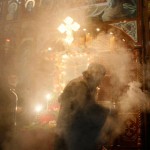by Fr. Patrick Henry Reardon
 Having determined that repentant prayer alone turns away the divine wrath, we should also consider two ritual gestures in which such prayer may be expressed: the offering of incense and the devout raising of the hands. Since Holy Scripture regards both these elevations as symbols of the soul’s ascent to God. It is no wonder we sometime find them joined in a unified ritual.
Having determined that repentant prayer alone turns away the divine wrath, we should also consider two ritual gestures in which such prayer may be expressed: the offering of incense and the devout raising of the hands. Since Holy Scripture regards both these elevations as symbols of the soul’s ascent to God. It is no wonder we sometime find them joined in a unified ritual.
Perhaps Psalm 141 (Greek 140) best illustrates this perception. This psalm, still chanted at every Vespers service in the Orthodox Church, has been the evening prayer of God’s People since the time it accompanied the Evening Sacrifice in the Temple.
I cite the psalm’s relevant verse in the economy of the Hebrew text:
“Let my prayer be constant, incense before Your face; the raising of my hands, the evening sacrifice.”
The only finite verb here (tikkon, “to be steady,” or “constant,” or “established”) is unexpected, perhaps. At first glance, few things seem less constant, less “steady” than an incense cloud; it can be kept constant only by an ongoing renewal. Otherwise it dissipates.
The prayer must be continuous, then, in order to remain ever in God’s sight. What the psalmist apparently has in mind is the ongoing and permanent ascent of his prayer before the face of God. The incense fragrance, symbolic of prayer, rises up to Him along with the elevation of prayerful hands. Both the incense and the raised hands give expression to his devotion.
Although the two ritual elements are joined in this psalm, it is worth looking at each of them individually:
First, the raising of one’s hands is surely among the most primitive and basic expressions of prayer. Spontaneously the person who prays lifts up both arms to God, much as a small child seeking to be held. Carved art in biblical lands testifies to this gesture from regions as distant as Sumeria and Crete. In both biblical testaments, moreover, raising the hands is a common prayer-posture; one observes it, also, in the Church Fathers and, ubiquitously, in the art of the Christian catacombs. St Paul may be taken, in this respect, to speak for the universal tradition of the biblical faith:
“I desire that in every place men should pray, lifting up holy hands” (1 Timothy 2:8).
Second, the offering of incense with prayer appears, not only in the prescriptions of the Mosaic Law, but also in the heavenly sanctuary itself. When the door to heaven stood open so that John could gaze within, he beheld the four-and-twenty elders
“with golden bowls full of incense” (Revelation 5:8).
Later in the same book, John describes a more elaborate ritual:
“Then another angel, having a golden censer, came and stood at the altar. He was given much incense, in order make an offering, with the prayers of all the saints, upon the golden altar that was before the throne. And the smoke of the incense, along with the prayers of the saints, ascended before God from the angel’s hand” (8:3-4).
Since the offering of incense is symbolic of—and frequently accompanies—prayer, it is hardly surprising to find it connected to the turning away of God’s wrath.
Numbers 16 tells a pertinent story: During one of Israel’s desert rebellions, at a time when the Lord in His wrath sent a plague on the people, Moses instructed Aaron,
“Take a censer and put fire in it from the altar, put on incense, and carry it quickly to the congregation and atone for them (Hebrew: kapher ‘alihem; Greek: exsilasthai peri avton); for wrath has gone forth from the Lord” (Numbers 16:46; Hebrew/Greek 17:11).
St. Jerome, in his Latin translation of this verse, perfectly catches the sense of Aaron’s atoning act:
“Take a censer and put fire in it from the altar, put on incense, and carry it quickly to the congregation in order to pray for them—ut roges pro eis.”
The essential offering here is not the bare ritual of burning incense but the repentant intercession it symbolizes and embodies. Aaron averts the wrath of God through the prayer expressed in this rite. According to Jerome,
“He took incense and, standing between the living and the dead, he prayed for the people—pro populo deprecatus est” (16:47-48).
King Hezekiah made the same association:
“Now it is in my heart to make a covenant with the Lord God of Israel, that His fierce wrath may be averted from us. My sons, do not be negligent now, for the Lord has chosen you [priests] to stand before Him, to do Him service, and that you should minister to Him and burn incense” (2 Chronicles 29:10-11).
